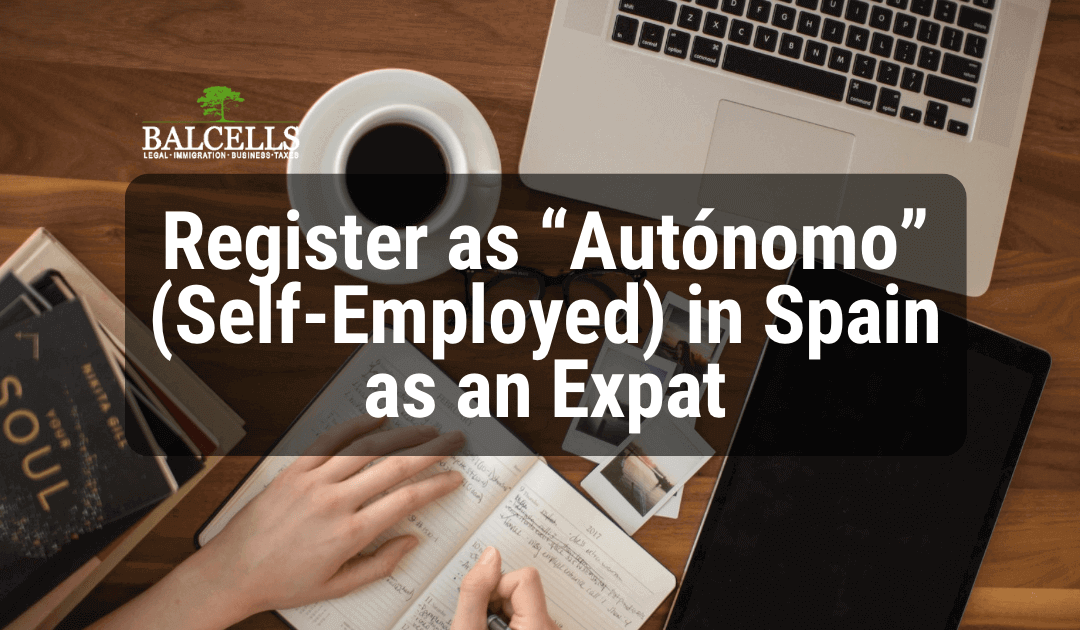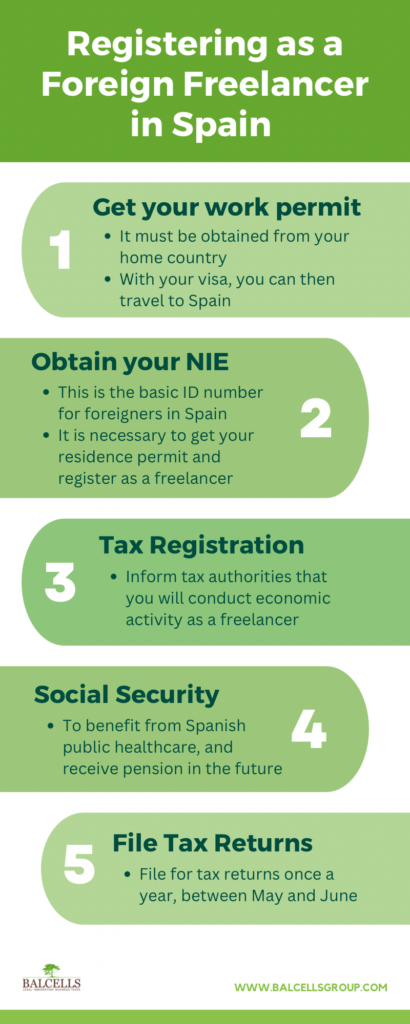Moving to a whole new country and working as freelance may sound intimidating – especially when it comes to completing all the necessary legal paperwork and paying taxes. But when it comes to Spain, becoming an autónomo or a freelancer as a foreigner is not as scary as it seems.
In this article, we’ll explain everything you need to know about registering as self-employed in Spain. We’ll go into detail about the different taxes you’ll need to pay, both quarterly and annually.
By the end of this article, you’ll be 100% prepared to start working and developing your own project independently and successfully become an autonomo in Spain!
Exciting, isn’t it?
What is an autónomo in Spain?
Autonomo is the Spanish word for a freelancer or self-employed individual.
Let’s use a clear example so you can easily understand.
Suppose you would like to move to Spain and become an English teacher. (This is actually very common.) You will have two options. The first is finding a job as an English teacher and then getting your work permit (which is fairly complicated, to be honest).
The second is becoming a self-employed individual and working on your own, without having any contract. This second option will be the focus of this article.
Once registered, you just need to send an invoice to the company or individual you are providing a service to, and that’s it! That will be how you’ll make money.
In which cases should you register as an autonomo?
It may not be 100% clear which ways to make money require registration as an autonomo, and which do not.
For example, you might think that selling products on eBay or Amazon does not require registration as a freelancer.
But you would be wrong.
Regardless of the activity you carry out, if you provide some type of service (such as a technological or IT service, or you teach English or speak at conferences) and most importantly: you profit from it; then you must register as a freelancer.
Yes, that means you will then start paying taxes as a self-employed person.
But, unfortunately, that’s what the law requires.
Can I really become a freelancer in Spain?
Let’s pause for a second and reconsider things.
Are you really eligible for self-employment in Spain? As always, the answer depends on your country of origin.
- If you are an EU/EEA/Switzerland citizen, no problem. You can enter the country and set up your company or become a self-employed worker easily. The process will be straightforward and you won’t experience any additional difficulties
- But things get a bit complicated if you are from a non-European country. First of all, you will need a visa to enter the Spanish territory. Then, a residence permit to stay permanently in Spain, plus a work permit as a self-employed. Furthermore, you will be required to obtain an NIE number and a Spanish bank account
How to register as autónomo in Spain: Step by step
Let’s review each of the 5 steps you will have to go through as an expat to become an autonomo in Spain.
But before we go into detail, here’s an infographic of the process summary:
1. Get your work permit
As we have previously mentioned, if you are not from the European Union or EEA, you will need a work permit in order to become a freelance in Spain. That is why this is the first step on the list.
You will need to apply from your country of origin – and this is crucial. Traveling to Spain and starting your work permit application procedure from here will only yield a denied request. So, what do you have to do?
You’ll need to submit the required documentation at the Spanish consulate and get your visa.
Then you will be allowed to travel and enter Spain, where you will get your residence permit and continue with the process.
For more specific information about how to get the work permit as a non-EU citizen visit this article.
2. Obtain your NIE number
The NIE number is the basic identification number for foreigners.
You can request it once you enter Spain with your visa, as you will need it to both get your residence permit and to register yourself as an autonomo. This number is essential, as will be used for nearly every legal or bureaucratic procedure in the country.
Along with your passport, you just need to submit the EX-15 form at your local Immigration Office, and you will get it straight away.
But remember to first book an appointment before going there.
3. Tax registration: the IAE
The next step is to register yourself with the tax authorities.
There is something called IAE (“Impuesto sobre las Actividades Economicas”), which you need to register at your local Tax Agency office. Just to let you know, the tax agency in Spain is called “Hacienda”.
This process is simply registering yourself at the tax agency so they know that you will start conducting economic activity as an independent professional. Therefore, you are notifying them that you will start sending invoices, and therefore should be income-taxed.
How does this process go? It’s really simple and won’t take more than 15 minutes:
First of all, you need to book an appointment at any office that the “Agencia Tributaria” has. You can do it here.
When you go there, you will be asked the group number that corresponds to your specific economic activity. You can find that number here. If you are not sure or haven’t checked it out, don’t worry. The civil servant will help you out and find it for you.
Then, you will fill out model 036 or model 037. You will be told which one should you use, but many times it will be the 037 (a simplified one); as the 036 is commonly used for setting up a company (even though it has additional purposes).
Don’t forget to bring the following documents to your appointment:
- Your NIE number
- Passport and a copy of it
- Bank account number
And that’s it! You will have signed up for the IAE. Now you can start sending invoices and providing your services to your clients.
Now that you can legally start doing freelance in Spain, there is one step left. You need to register in social security. Why? Because it will be the process that enables you to enjoy the Spanish health care system benefits and receive a pension in the future. You will be entitled to those benefits after paying a monthly fee, as we have discussed in a previous section.
Let’s explain how this step works.
You will need to visit any of Social Security’s offices within the first 30 days after you registered at the tax agency.
There, you will register for a special regime created for autonomos called RETA (“régimen especial para trabajadores autónomos”).
The documents you must bring with you are:
- Your NIE number
- Passport and a copy
- Model 036 or 037 (depending on your case)
- IRPF form, the one you got from the tax agency office
- Address registration document (padrón)
5. Daily operations and tax returns
And, that’s it! Time for the real adventure.
You will be now fully prepared to start your journey as an expat autónomo in Spain.
All the boring legal paperwork is done, so it’s time to start your job (to do it successfully it will help to understand the management culture in the country, which you can do here).
But, as we discussed in the liabilities section, the party does not end there. You will need to file your tax returns: both for the VAT and for the income tax.
These are the two different paths you can follow:
The first one is the one we do not recommend. You can devote a huge amount of time to understanding and learning how to file your tax declarations, and do that by yourself (it can be complicated, especially as a foreigner).
The problem is that it will take a lot of time for you. And that time is not worth it. Why? Because you, as a self-employed individual, can be spending those ours doing something more productive: focusing on your professional activity. Not worrying about taxes.
That is why, the second path (which we recommend), is to have an accountant who will do the job for you. You will just need to send her all your invoices (received and sent), and she will manage everything on your behalf.
Your life will be much easier.
At Balcells Group we offer monthly accounting services both for companies and self-employed individuals. That is why we will be happy to help you manage your taxes in Spain!
Self-employed versus setting up a company. Which is better?
There are two legal ways under which you can perform your activity as an independent professional. You can set up a company or you can become an autonomo.
Which one is best? Should you really become a self-employed worker?
Well, it depends.
If you want to get a detailed answer, you can access here our article wherein we talk about the main differences between an S.L. and becoming an autonomo.
But, just to give you a quick overview, you will find that becoming a freelancer in Spain is much easier.
The legal process is faster and does not involve the same level of bureaucracy. Furthermore, there is no minimum capital investment to start working, and your tax duties are simpler.
So if you don’t want to incur extra steps, then autónomo is the way is for you.
Nevertheless, if you predict you will have a high level of income (over €60,000 per month), setting up a company would be the better strategy, as you would be paying less taxes.
Taxes for autonómos in Spain
Before starting the step-by-step legal process to become an autonomo in Spain, this section is going to be essential.
If you can understand what your three main responsibilities will be as a freelancer in the country, you will know exactly why you’ll need to go through all the corresponding legal steps.
Basically, as a self-employed person, you will have three basic obligations: pay income tax annually, pay VAT quarterly, and pay Social Security monthly.
Let’s analyze each of these taxes in detail.
The first tax, which you will have to pay monthly, is the “self-employed quota”, or Social Security payment.
This monthly payment is necessary to receive assistance from Spain’s Public Health system, in addition to being able to receive a pension in the future, and other benefits.
So, how much is the self-employed quota?
Understanding the exact amount you will have to pay is not an easy task, but below we try to give you a practical summary.
As of January 1, 2023, the self-employed quota functions under the new contribution system, now based on your actual income.
That is, before 2023, self-employed workers paid a fixed fee independent of what they generated, but now this fee increases as you generate more income.
There are 15 different ranges of net income.
Thus, you must make a forecast of what you expect to earn during the year, and, based on that, choose one income range.
Within this specific range, you must also choose if you want to contribute more or less to Social Security; being able to choose a minimum or maximum contribution according to your preferences.
With this, the fee is calculated by applying a contribution rate of 31.20% to the contribution base that you choosewithin the range of net income to which you belong. Keep in mind that the contribution base can be changed up to 6 months a year (every 2 months).
Then, at the end of each year, an adjustment is made based on what you planned to generate vs. what you ended up generating. That is, Social Security will refund your money if the final net income range has been below, or you will have to pay the difference if it has been above what is indicated in your forecasts.
What bonuses do self-employed people have in Spain?
While we’ve seen that any self-employed person in Spain must pay around €300 per month to Social Security, there are certain exceptions.
This is what is known as discounts or reductions.
For example, during the first year as a freelancer you will only pay €80 per month. This flat rate can be maintained if the individual’s net income is less than the interprofessional minimum wage.
If you are a man under 30 years old and woman under 35 years old who has enjoyed this €80 flat rate for the initial two years, you can have a 30% reduction on social security contributions for another 12 months. This means, you can have a maximum of three years of discount before you start paying in full.
Additionally, victims of gender violence, victims of terrorism, or persons with disabilities equal to or greater than 33% can request at the time of registration, a flat rate of €80 for the first two years.
After paying a flat rate of €80, the price will gradually increase to a total of €294 per month. The 294 euros is 31.20% of the minimum contribution base of €950.98.
Income Tax
You will pay income tax quarterly, after declaring the income from your operations and deducting expenses.
You will pay 20% of the resulting amount. Subsequently, between May and June, you must submit the so-called income tax return (once a year, keep in mind that the Spanish tax year corresponds exactly to the calendar year, from January to December). That’s where the actual tax rate will be adjusted.
What do we mean by that? If what you really had to pay according to your income level was more than 20%, you will then have to provide the difference. But, on the other hand, if the applicable rate should have been lower, you will receive a refund.
VAT (Value Added Tax)
VAT is the tax that must be included in all the invoices you send to your clients, representing 21% of the price. It is declared quarterly. How? Deducting the VAT paid on your expenses as a freelancer (Internet connection, for example) from the VAT charged to your clients. And the resulting amount must be paid to the Treasury.
With these two responsibilities in mind, we can now move on to the legal steps to register you as a foreign freelancer. It’s quite simple: to become self-employed in Spain you must register for both: social security and tax agency.
If you don’t want to navigate this tedious process on your own, our corporate lawyers are ready to help and guide you step by step. Send us an email and we will manage each procedure for you.
How long does it take to register as self-employed in Spain?
Generally, registering as an autonomo at the Tax Agency and Social Security usually takes 1-5 days.
As you can see, it is a very fast process.
But to ensure that this is the case for you (and that it does not take longer than necessary) our recommendation is that you have professional help.
Well, having all the documentation perfectly prepared and ready is what will allow you to register quickly so you can start working and invoice as soon as possible.
As always, we are ready to help you and guide you throughout the entire journey, so don’t hesitate to reach out.
Book a consultation with one of our lawyers and solve all your doubts:

At Balcells Group we have been foreigners effortlessly moving to Spain for over 11 years. We help expats from all around the world with their immigration, business, tax and legal needs; ensuring a legally safe and enjoyable transition to the Spanish territory. Our multilingual team understands the importance of adapting to the cultural and legal specificities of our international clients. We offer a comprehensive service that combines the expertise of several generations of lawyers with the innovation needed to address today’s legal challenges, always striving to simplify processes and ensure reliable, effective results.






Thanks for putting together this information. You really took the fear element out of spanish B.